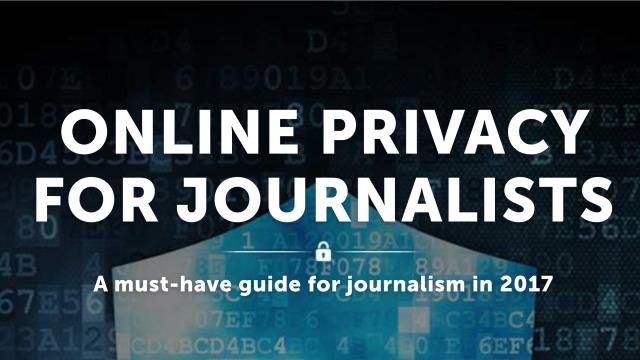
We live in a time of journalistic prosecution, as investigative journalists get increasingly targeted for simply doing their job. The Obama Administration prosecuted more individuals under the Espionage Act than all previous administrations combined; in fact, it used the law to prosecute journalists almost exclusively.
It is imperative that journalists protect themselves as they continue to pursue their important work in the face of growing government control. That is why Michael Dagan, a former deputy editor of the Israeli newspaper Haaertz, and Ariel Hochstadt, a former security expert as well as a marketing expert for Google, have created a guide, Online Privacy for Journalists, to help journalists protect both themselves and their sources.
“Many journalists whom I have spoken with recently expressed concern for whatever lies ahead for the freedom of the press. All encryption systems can be compromised, if someone has the perseverance to track them,” writes Dagan in an introductory paragraph. “The good news is that it is nevertheless possible to make it difficult for anyone to try and intercept your emails, the text messages you’re sending or your phone calls.”
One may be surprised by the extreme measures the guide suggests are necessary as preventive steps to ensure the highest likelihood of a journalist maintaining privacy. Here are some examples:
-
Only download apps that require minimum rights.
-
Beware of big names because they are known to blindly comply with requests from the government for information.
-
Use separate computers for correspondence and purchase new computers from pawn shops.
-
Use disposable e-mails and disposable phones specifically for the use of speaking with your source. Make sure the source does the same thing.
-
Don’t talk to sources over the phone: phone companies store important metadata.
-
Don’t send messages over SMS text.
-
Perform full disk encryption. Don’t rely on cloud storage because that can be more easily accessed.
-
Fully encrypt e-mail and make sure the source does also.
-
Private browsing in Chrome or Firefox does nothing important. TOR Browser is one of the few secure methods to browse the web, despite its pitfalls.
-
Do not use organizational chats: Campfire, Skype, Google Hangouts, or Slack. They are easy to break in.
-
Use passphrases over 20 characters. Use a series of words that make sense only to you.
-
Use two-factor authentication.
-
Don’t keep notes on any information about the source, on your laptop or anywhere – even on paper.
-
Use a VPN at all times when possible.
If the list of measures seems exhaustive and thorough, that's because it is. But given the current climate of threat to journalists at home and abroad, the guide clearly fills a need. Its message is simple: The delicate, important, noble work of investigative journalists must be protected, and the brave individuals who carry it out must protect themselves as well.
The most recent, tragic example was the murder several weeks ago of investigative journalist Daphne Caruana Galizia in Malta. “Caruana Galizia was a harsh critic of the government and effectively triggered an early election this year by publishing allegations linking [Prime Minister Joseph] Muscat to the Panama Papers scandal,” wrote the BBC. The killing of Caruana Galizia, whose popular blog targeted opposition politicians, is one of many examples of recent journalists – from Russia to Mexico to the Philippines and beyond – who have been silenced for investigating and writing the truth.
In the U.S., where journalist assassinations aren't so common, questions tend to center more on cyber security for whistleblowers – think Chelsea Manning, Edward Snowden, James Risen, Glenn Greenwald and Julian Assange. Nonetheless, the message is clear: Journalists everywhere need to take to heart the precautions and suggestions laid out by Dagan and Hochstadt. Furthermore, everyday citizens should consider using these techniques to protect their privacy as well.
The full text of the guide can be found here.
3 WAYS TO SHOW YOUR SUPPORT
- Log in to post comments











